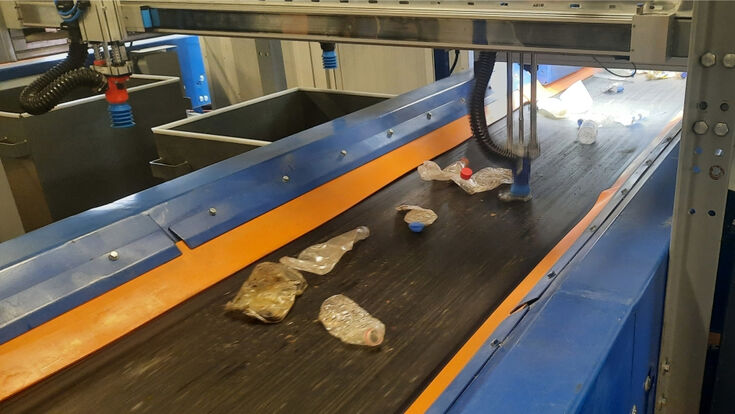Recycling : RECLAIM: Efficient material recovery, everywhere!

Nowadays, recent technological advancements have facilitated the modernization of industrial Material Recovery Facilities (MRFs), which are mainly supported by automated equipment specialized on waste treatment. Despite the success of these large-scale facilities, there are cases where new, more innovative solutions are needed to reduce costs and improve waste treatment efficiency even further. This is because the transportation of waste to MRF plants can be very costly in some cases and also, the use of a single large-scale facility does not provide much space for adaptation in order to address the individual needs of waste streams with diverse characteristics. To address the waste processing requirements of different cases such as rural or distant areas, transport hubs, or open-air concerts, a new trend has emerged, which regards the use of light and portable waste management units that can be easily deployed wherever needed to undertake the recovery of valuable recyclables. Until today, the existing solutions are manually operated and completely lack the support of AI or any other high-tech solution that could significantly enhance their productivity.
Project for efficient material recovery
RECLAIM aims to fill this gap. In particular, RECLAIM aims to exploit mature and well-tested AI-driven robotic waste management technology, which will be improved and embedded in a state of the art “portable, robotic MRF” (prMRF) that will be capable of significantly enhancing local-scale material recovery activities providing them with industrial-level efficiency.
Interestingly, aiming to overcome environmental challenges, the European Green Deal aspires to leave no person or place behind in waste management. Due to its portability, autonomy and efficiency, the prMRF will significantly contribute to achieving this goal.
Bringing together complementary objectives
The RECLAIM project is structured around complementary objectives. The first concerns the design and implementation of an eco-friendly prMRF supported by established mechanical recycling equipment to develop a highly efficient waste processing chain. RECLAIM aims to showcase the ability of the prMRF to easily deploy and operate over long periods in the recovery of recyclable materials, but also showcase how the prMRF operation can be adapted to waste streams with different characteristics.
Another main objective of the project is to improve the efficiency of robotic material recovery. Significant improvement is required in the robotic technology commonly used for material recovery, in order to make it fit and work efficiently within the prMRF. RECLAIM aims to develop Robotic Recycling Workers (RoReWos) that are low-cost, low-volume, multi-functional and also achieve a high pick-per-invested-euro index. The application of RoReWos will be scalable and their number will be adjustable according to the needs of each application domain. RoReWos are to take on distinct roles in order to form a highly efficient team that recovers and sorts many different types of recyclables.
Moreover, RECLAIM sets out to exploit and advance state of the art AI technologies to effectively address the identification, categorization and localization of recyclable waste. To this end, it combines hyperspectral imaging together with RGB-based computer vision and Convolutional Neural Networks (CNN) technology to develop an advanced monitoring system that effectively supports difficult waste treatment tasks.
Cost effective
Regarding the progress that has been made in the first phase of RECLAIM, as of spring 2023, the container-box that will house the prMRF is fully constructed and ready to host the smart and autonomous material sorting technology. In parallel with the implementation of the prMRF container, all relevant technologies have been developed and tested. The integration of the core components of prMRF has already taken place, with early trials focusing on the recovery of a single material type providing very successful and promising results. In particular, the implemented RoReWos have a cost that is one third of the average delta-robot cost, which is widely used in large-scale MRFs. However, it is worth noting that RoReWos accomplish half the picks made by delta-robots, per minute. Therefore, two RoReWos can produce the same results as an ordinary delta robot, even though they cost less. Alternatively, by spending the amount that one delta-robot costs, we can install three RoReWos and gain fifty percent more in terms of productivity.
Social sensitivity and sharing knowledge
Apart from the technical work focused on the treatment of waste, another RECLAIM objective is to increase social sensitivity on recycling and even more, engage citizens in material recovery research. Building upon the gamification principles, a Recycling Data-Game (RDG) is developed to facilitate the participation of citizens in the collection of waste image data that are used to incrementally and constantly improve the performance of the material identification, categorization and localization module.
The RECLAIM consortium supports Open Science practices, promoting the sharing of knowledge, data and tools. To this end, the project will create open datasets of annotated RGB and hyperspectral waste images. Research data collected by citizens using the Recycling Data-Game (RDG) will be readily available through public repositories, free for use internationally. It is therefore expected that the data generated in this project will form the basis for future research in the field of intelligent and automated waste treatment and valuable material recovery.
Shaping the future
One final yet highly significant objective of the project is to reach a wide range of potentially interested stakeholders to maximize its impact. RECLAIM aspires to shape the future of global recycling activities, promoting distributed waste treatment based on high-tech prMRF-fleets that achieve material recovery anywhere, even in the most remote areas. RECLAIM will actively seek to leverage the acquired knowledge and developed technology beyond the project and create opportunities for commercialization of RECLAIM’s innovations, thus positioning Europe as an international technological and industrial leader in green transition.



